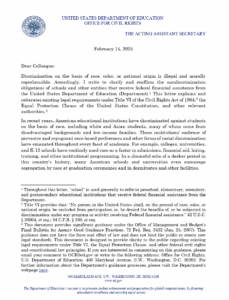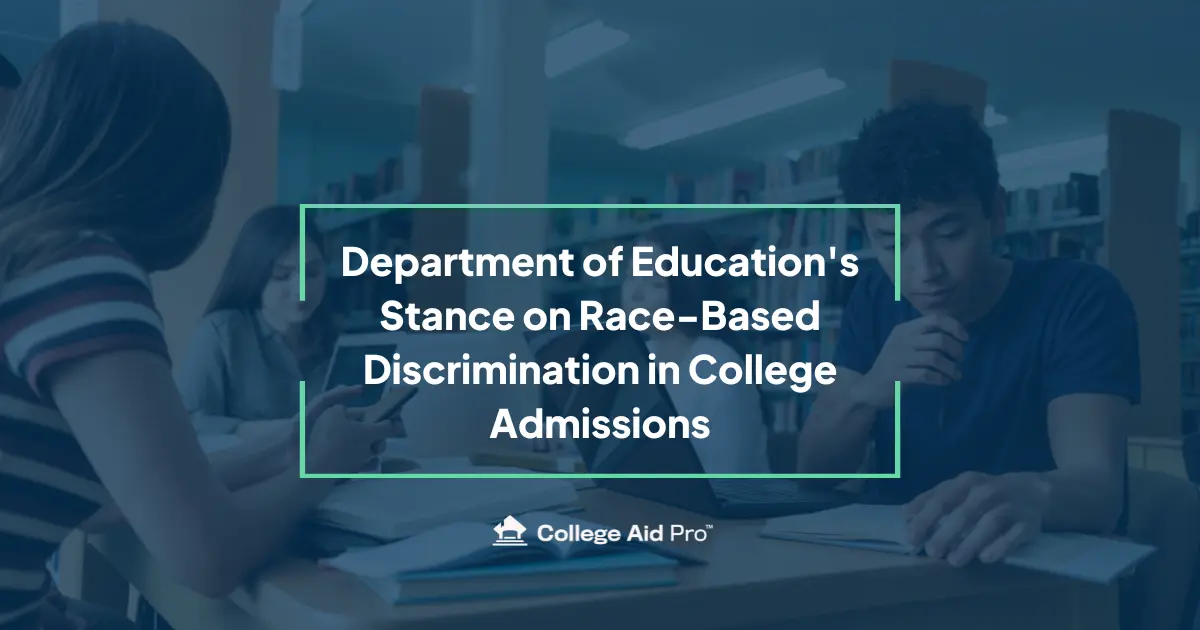 Key Considerations and Impacts of the U.S. Department of Education’s Stance on Race-Based Discrimination in College Admissions
Key Considerations and Impacts of the U.S. Department of Education’s Stance on Race-Based Discrimination in College Admissions
On February 14, 2025, the U.S. Department of Education issued a strong reaffirmation of its commitment to ensuring that educational institutions uphold the legal standards set forth by Title VI of the Civil Rights Act of 1964. The Department’s Office for Civil Rights (OCR) made it clear that racial discrimination—whether overt or covert—has no place in our schools, colleges, or universities, especially in practices surrounding admissions, financial aid, and campus life. This article will delve into the critical insights from this guidance, its impact on college admissions, and considerations for students and families navigating the college planning process.
Understanding the Legal Framework of DOE’s Stance on Race-Based Discrimination in College Admissions:
The Office for Civil Rights emphasized that race-based discrimination violates federal law, which prohibits educational institutions from discriminating against students on the grounds of race, color, or national origin. This legal position has been reinforced by the Supreme Court’s 2023 ruling in Students for Fair Admissions v. Harvard, which clarified that any use of racial preferences in admissions must pass “strict scrutiny.” This means that race can only be considered in a limited, narrowly tailored way to address historical discrimination or critical safety concerns.
The Shift Away from Race-Based Preferences:
One of the most important aspects of the recent Department of Education guidance is the unequivocal rejection of race-based preferences in admissions and other aspects of college life. Schools that have used race as a determining factor in admissions, hiring, or even financial aid decisions will now need to reevaluate their policies. The Department specifically warns that schools cannot rely on indirect or proxy measures—such as eliminating standardized testing or relying on certain extracurricular activities—to achieve racial diversity.
For students and families, this means that colleges and universities will increasingly need to focus on merit-based criteria and individual student qualities rather than race or demographic factors. This shift is likely to alter how schools approach their admissions processes moving forward, with potential impacts on the diversity of the student body and how colleges frame their diversity, equity, and inclusion (DEI) programs.

Key Considerations for College-Bound Families:
For students and families navigating the college admissions and financial aid landscape, there are several key takeaways from this recent guidance:
- Focus on Merit-Based Decisions: The shift toward merit-based admissions underscores the importance of academic achievement, extracurricular involvement, and individual accomplishments. Students should prioritize building strong portfolios that reflect their unique strengths and passions, rather than focusing on meeting quotas or engaging in race-based strategies.
- Understanding Financial Aid and Scholarships: Financial aid decisions, including scholarships, cannot be based on race. Students should ensure that financial aid decisions are being made according to clear and fair criteria. It is essential to seek out scholarships that focus on individual achievements or needs rather than demographic factors. Families should also be proactive in questioning any discrepancies in financial aid packages.
- The Impact on Campus Diversity: While some students and families may be concerned about the broader impact on campus diversity, it’s important to recognize that diversity can still be achieved through holistic approaches that consider students’ experiences, interests, and personal backgrounds. The core values of diversity and inclusion will remain a priority in college admissions, but schools will now need to rely on non-race-based factors.
- Ensuring Equal Access for All Students: The guidance from the Department of Education emphasizes the importance of ensuring that all students, regardless of their race or background, have equal access to opportunities and resources. This means that schools must strive to create inclusive environments where all students are encouraged to succeed based on their abilities and ambitions.
What This Means for the College Planning Process:
For families navigating the complex college planning journey, these legal clarifications can have significant implications. College Aid Pro is committed to helping families understand these changes and ensure they are well-prepared to make informed decisions about college admissions and financial aid. The focus moving forward will likely be on factors like academic performance, personal development, community involvement, and financial need.
At College Aid Pro, we emphasize the importance of transparency and early planning in the college admissions and financial aid process. Families must be proactive in discussing the true cost of college, understanding financial aid options, and seeking out scholarships that align with their individual circumstances. In light of these changes, students should also take the opportunity to advocate for themselves and ensure they understand how admissions and financial aid decisions are being made.
Looking Ahead:
For families looking for guidance on navigating these changes and ensuring a smooth college planning process, College Aid Pro offers tools and resources to help. From understanding financial aid packages to finding scholarships that match your family’s unique needs, we are here to provide support every step of the way.
Get Started Today: Create your free MyCAP account to gain access to personalized tools and insights that can help you navigate the changing landscape of college admissions and financial aid. Let us help you find the best opportunities for your child’s future, without the confusion or uncertainty.




